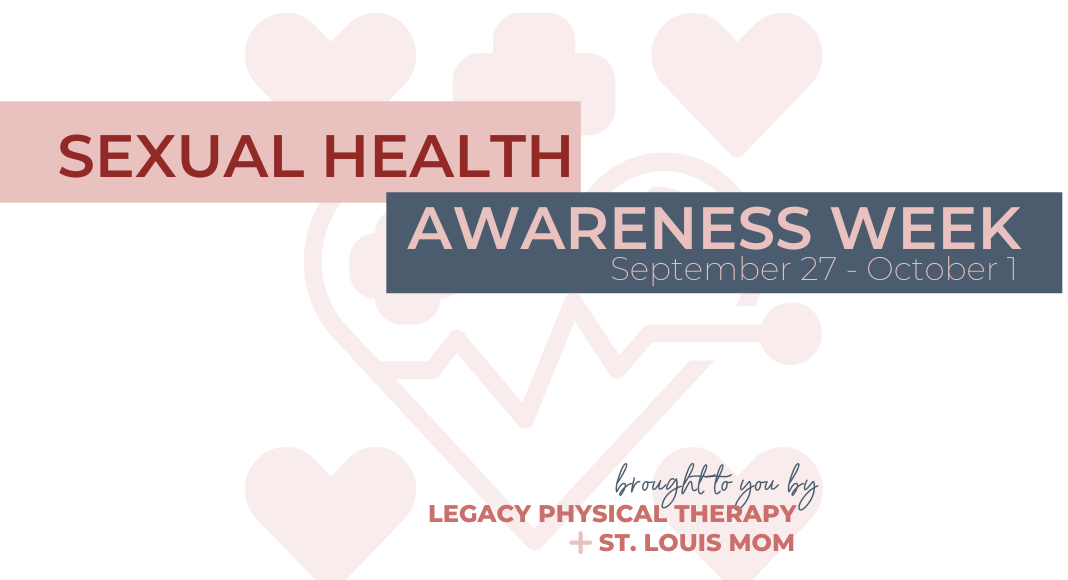Let’s Talk About Sex Drive with Therapist, Mika Ross!

STLMom is partnering with Legacy Physical Therapy to present our first annual Sexual Health Awareness Week. Legacy Physical Therapy helps women at all stages of their lives with their pelvic health. Sexual Health has typically been a neglected topic, and together, we hope that by shining a spotlight on it can help moms kickstart the discussion and find resources that can help.
STLMom spent some time today on Instagram Live with therapist and relationship expert, Mika Ross. She has a local practice, but she also works with individuals and couples worldwide. Today, she tackled the topic of sex drive and the impact that motherhood can have on it. Here is a recap of the questions that we covered!
How do you keep intimacy from feeling like a chore when your sex drive is zero?
Many factors can affect sex drive. One huge factor is testosterone levels. It helps to think of our testosterone reserves as gas tanks. A man’s tank would typically register as 9/10 full, whereas a woman’s tank often registers at 1/10 full. To understand the impact that motherhood has on our testosterone levels, three of the biggest things that get in the way of our testosterone levels are:
- Lack of sleep
- Caregiving
- Stress
Um … that pretty much sums up the mothering journey!
These testosterone levels seem somewhat unbalanced; however, they are telling us as we deal with the needs of our children that now is NOT a good time to have another baby. Our bodies naturally react to the stress and overwhelm and send out signals that we have enough on our plates.
It is essential to understand where our drive has gone because while we don’t have control over the stress, the caregiving, or the amount of sleep we may be getting, we DO have control over how we view our sex drive. We shouldn’t shame ourselves or each other and let it poison our relationship. It is far too easy to take a partner’s lack of sex drive personally. It is so much better to face the issue of waning sex drive with curiosity instead of judgment and shame.
At this point in the interview, Mika shared the words of a leading researcher in women’s sexual health, Dr. Laurie Mintz, Ph.D., who says that unscheduled sex is a myth. We need to find ways to get ourselves interested. People often find that while it is hard to find the spark to get started, they thoroughly enjoy it once they get going. So the trick is figuring out how to get over that initial hurdle.
So, how do we overcome our lack of sex drive?
First, determine what is getting in your way and find ways to fix it. Get more sleep. Give yourself more breaks. Help make it not feel like a chore.
As a woman, what are some possible reasons my partner doesn’t want to have sex with me?
When it comes to men and their sex drive, many factors can impact it, from hormonal issues to mood disorders such as anxiety or depression. There can be a medical condition as well. Beyond that, at times, men may have feelings get in the way of their physical desires. Talking through those feelings can genuinely help.

What if I’m ‘touched out,’ but my partner wants to be intimate at the end of the day?
As a society, the way we tackle motherhood is not how we are supposed to be doing motherhood. Mika Ross taught Human Growth and Development for many years and mentioned a documentary she used in class called ”Babies,” in which four babies from four different parts of the world are followed. They discover that in most other cultures and places, actual villages work together to raise children. They co-parent with many others, and mothers aren’t expected to do it all alone. However, that isn’t how we function here in America.
Ask yourself: ideally, how many times a week do you WANT to WANT to have sex? Come up with a number and share it with your partner. Have them do the same. Figure out what you need to do to make it happen. Communicate, communicate, communicate!

What if something deeper IS going on?
Other factors can impact sex drive, such as hormones, trauma, mental health issues, or even side effects from medications. If something physiological is going on, no amount of talk therapy will help. Mika often recommends a full medical exam to rule out any physical issues.
During our discussion, Mika was asked to recommend holistic practitioners for hormone assessments. While Mika made a few recommendations, she cautioned that insurance often doesn’t cover such visits, and perhaps it would be easier (and less expensive!) to start with a few books that she highly recommends, both by Dr. Laurie Mintz:
“A Tired Woman’s Guide to Passionate Sex”
What is the baseline recommendation for how often a couple should be having sex?
There is no magic number. The question shouldn’t be, “What is the frequency at which we should be having sex?” but rather, “How often would work best for me?” Ask your partner what their ideal number is, and work together to find common ground.
If your partner wants to have sex, but you’re not really into it, should you push yourself to do it anyway?
Mika cautions not to do ANYTHING that you don’t want to do. Don’t say yes when you mean no, don’t pretend something feels good when it really doesn’t. No good will come from keeping your real feelings and desires hidden. Ideally, you want to be in a relationship where you like your partner enough to WANT to WANT to have sex. This means that even if you aren’t feeling it, you want to feel it, so you will work toward discovering a way to increase your drive.
When it comes to “faking” desire or faking an orgasm, it is important to understand that, on average, about 95% of women don’t climax through intercourse alone. So don’t be discouraged if you need more! Dr. Mintz’s book, “Becoming Cliterate” is a great resource for more information about this.

Finally, what are some words of encouragement for moms?
Mika encourages us to understand that a well-balanced body and life lead to a good sex drive. So understanding where our imbalances lie will help us uncover our sex drive.
If you would like more information from Mika Ross, watch our Instagram Live video or join her “wellMAMA virtual workshop and community.” This workshop “gives you the tools, strategies, and mindsets to create meaningful change so you can stop feeling like a resentful battery that needs to be charged. AND we won’t leave you hangin’ like all those self-help books.” Click HERE for more information!










